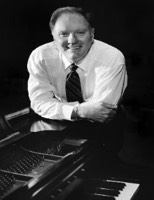
Harry Bulow

Bulow's musical style reveals influences from Witold Lutoslawski, Karel Husa, Peter Mennin and Henry Mancini. Musically eclectic, his music often includes aspects of sound-mass composition, minimalism, and American jazz. One of the key elements of his musicalidiom is the integration of jazz and commercial music with more classical and avant-garde oriented designs. The contemporary problems of fragmentation and brokenness found throughout society are qualities that the composer has integrated into his music. He was the first to combine the use of traditional Japanese instruments with the Western wind ensemble. And he developed two new forms of music, Micro Music and Fracto-Music. Micro-Music is the creation of concise musical art pieces of short duration. Some works may be as short as 5 seconds (Ex.: "The Pitch" for Band, Announcer, P.A. System and Data Projector). Fracto music is a form of music where a melody or other musicalparameters such as harmony, rhythm, or timbre, may be broken into small fragmented units and recombined with itself or other musical structures within a work; a form of musical deconstructionism (Ex.: Food Court, for solo piano, and/or chamber ensemble).
He has appeared as a saxophone soloist with numerous bands and orchestras throughout the United States including the Honolulu, Santa Barbara, and the San Diego symphony orchestras. He is Professor of Music and Head of the Patti and Rusty Rueff School of Visual and Performing Arts at Purdue University.